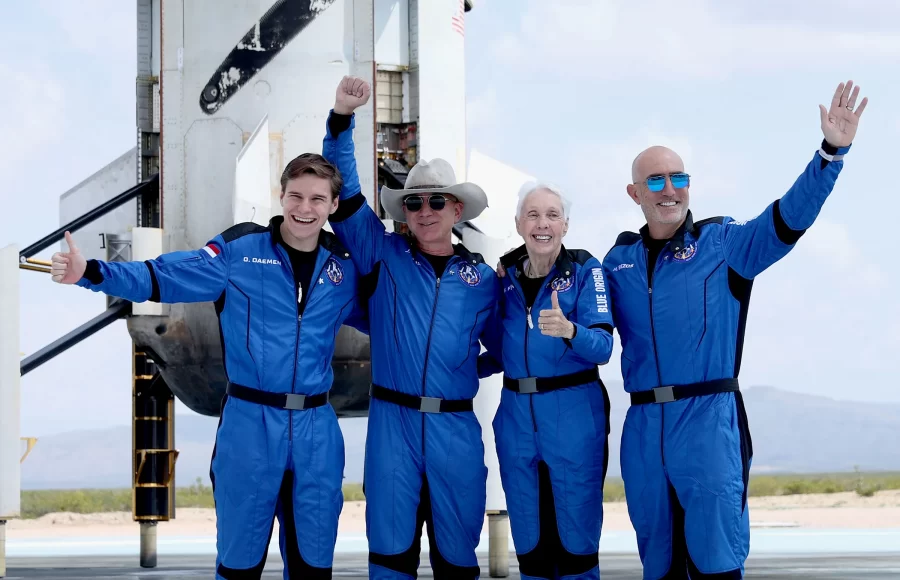Bezos takes Shatner into the final frontier
Space Tourism acts as an important influence for future generations of scientists
November 4, 2021
These past few months have been disappointing ones. We have been forced to watch our government’s repeated failures regarding climate change while Facebook ducks for cover, trying to avoid the flaws within their company and their handling of our data.
One common emotion I keep feeling as a result of all this is the disdain of corporations and the people who run them. What does not help are the millions of people in the world who live in brutal conditions and are forced to watch billionaires fly off into space on their “Ego Quests” (a title of a recent SNL skit).
As part of a new industry known as space tourism, members of the 1% are building their own spaceships and setting out to explore the expansive darkness above us, or as Neil DeGrasse Tyson explains it, just sort of touch the border between space and Earth. No one is going as far as to call these billionaires actual trailblazers in space travel.
It can be very easy to laugh (or cry out in anger) at space tourism but I have to admit that I did recently change my opinion on the industry. I was skeptical at first, as I could not understand how these men could ignore the pain and suffering of our society as they plunged millions into a new avenue of space tourism. I’m not actually against space travel because I do think it is important to look to the stars and expand our understanding of the universe and look for ways to improve humanity.
This is not what Bezos and the other billionaires are doing, though. Rather, their actions can be seen as irresponsible and hurtful to humanity at large. This was (and somewhat still is) my opinion on the age of space tourism, but I started to come around a few weeks ago when I watched William Shatner fly off on a marvel of a spaceship and boldly go where no 90-year-old had ever gone before.
If you don’t know, Shatner is an actor best known for his role as James T. Kirk, captain of the Starship ‘Enterprise’, as seen throughout all the Star Trek media. Shatner took on the role in 1966 and quickly became an icon for millions of viewers. Every week, the Enterprise would go on daring adventures, often having to rely on science and technology to prevail against various challenges.
This captivated audiences and provided a sort of refuge for a generation that placed science in the category of “nerdy.” People were able to see that science can be cool and fun. For those kids whom (I’m assuming) were wearing their bowties and knee-high shorts, this meant the world to them.
In fact, many of today’s top researchers and scientists claim Star Trek is what made them want to explore science, referencing it as they work their own jobs of researching and expanding our own scientific boundaries. Elon Musk himself has claimed that Star Trek had a big influence on him while growing up, and Musk is one of the leading innovators of modern science. Would we have the modern advances we have today without Star Trek, a mere television program?
To me, this is what makes Shatner going into space so cool — it will continue to inspire a whole new wave of future leaders in science, a lot of whom might still watch Star Trek. Now, whenever I hear someone detract against the billionaire space race, I am quick to remember that there is probably a 10-year-old kid sitting in some backwater town somewhere who — inspired by the sight of a rocket ship carrying the actor of that old show they love — may go on to produce a life-saving invention.
Kids all over the world are being inspired — all because they turned on the TV and saw that science can take them to the final frontier, a place where no human has ever gone before.






















